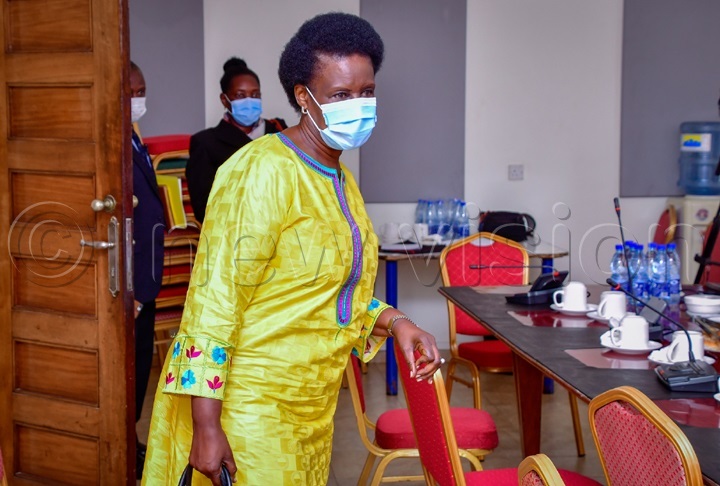MPs quiz Kyambadde over selective re-opening of arcades
The government had maintained lockdown on arcades because of the difficulty to avoid close contact between people in the wake of COVID-19
The Parliamentary committee on the national economy, currently scrutinising the impact of COVID-19 on the economy, has tasked trade minister Amelia Kyambadde to explain the selective reopening of arcades in Kampala.
According to Syda Bbumba (Nakaseke North), the chairperson of the committee, they had received petitions from different stakeholders such as landlords and tenants that some of the arcades that were declared safe for re-opening, don't meet the required standards for COVID-19 Prevention measures.
"I don't know what criteria was used to open those arcades and you left out others yet they meet the standard operating procedures (SOPs). I know one of the arcades which were okayed to reopen but it is always very crowded," Bbumba said.
On Tuesday, Kampala minister Betty Amongi said 48 out of the 86 arcades assessed by a select committee on arcades had met the set guidelines for standard operating procedures. Some of the arcades included Mukwano Arcade, Modern Complex, Grand Corner Plaza, Arua Park Plaza, Arua Park Annex, Magoba shopping Mall, Mega Plaza, KK Trust, and Ham Shopping Grounds among others.
However, during a meeting on the impact of COVID-19 on the trade industry, the committee quizzed Kyambadde to explain to Parliament the criteria used in recommending for the re-opening of the 48 arcades leaving out others.
"We have got reports that people are paying money to be put on the list of those who should be re-opened, landlords are losing tenants to those whose arcades have been asked to re-open, we want transparency," Bbumba noted.
The MPs also expressed concern that the government had forgotten about other service providers such as saunas, gyms, and bars, whose voice for re-opening has not been amplified enough.
Aston Kajara (Mwenge County) said: "We know you have been advocating for the arcades, but who is advocating for sauna, gym and bar owners yet they are less risky than arcades".
In response, however, Kyambadde who was in the company of technical officials from the trade industry and cooperatives ministry defended the 48 arcades that had been selected for re-opening saying the procedure for their selection was transparent.
According to Kyambadde, 86 arcades had been inspected by a technical committee comprising of officials from the traders, landlords, scientists, and Kampala Capital City Authority (KCCA) who come up with a list of only 48 as the only ones meeting the SOPs.

"These are the ones that meet the requirements for now. During the inspection, some landlords refused to open their arcades for inspection and we are saying if you don't open for inspection, you will not be re-opened," Kyambadde explained.
She added that during the inspection, the team had an SOP requirement checklist which formed the basis on whether the arcade should be re-opened or left closed.
According to Kyambadde, some arcades were left closed because they lacked water or had limited airspaces, exits, and entrances, which she said need to be fixed before they are re-opened.
Kyambadde also dismissed reports that some arcades had not been re-opened because they had not paid money to members of the inspection team.
"If anybody is asking for money, please tell us, because that is corruption, if it is KCCA, we shall punish them," Kyambadde said.
She however assured that once the remaining over 30 arcades meet the required SOPs, they will be re-opened and be allowed to work.
The government had maintained lockdown on arcades because of the difficulty to avoid close contact between people in the wake of COVID-19 Pandemic.
COVID-19 Impact
Kyambadde had appeared before the committee to brief Parliament on the impact of COVID-19 on the trade sector.
In her report, Kyambadde said Uganda had registered a decline in exports since the COVID-19 Pandemic outbreak.
"Between January and April 2020, the country's formal exports declined by 46.3% with the sharpest decline (38%) being registered between April 2020from $386m in January 2020 to $207m in April and $290m in May 2020," she said.
She noted that the informal exports which constitute about 15% of Uganda's total exports have experienced the highest level of decline at 98.1%.
Kyambadde told the MPs that the COVID-19 preventive measures had had a great impact on the domestic market which led to among others, loss of jobs and reduced hours of work/employees for some businesses including factories and industries as well as complete closure or suspension of operations.
As a mitigating factor, Kyambadde however told the MPs that the ministry had since moved to equip SMEs with tools and skills that can enable them to become competitive and resilient in meeting market demands by the domestic and international business environment.
The MPs however asked the ministry to source credit for small scale enterprises especially those in the informal sector, whose capital has been fast spent during the lockdown.